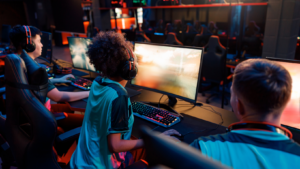In the fast-paced world of esports, one factor that’s gaining momentum is national league voting. This democratic process, where fans and players alike have a say in shaping the future of their favorite leagues, is revolutionizing the esports landscape.
National league esports voting is not just about choosing teams or players. It’s a powerful tool that can influence key decisions, from rule changes to tournament formats. This article will delve into the intricacies of this new trend, shedding light on how it’s transforming the esports industry.
So, whether you’re an esports enthusiast or a curious onlooker, buckle up for an enlightening journey into the heart of esports democracy.
National League Esports Voting
 Delving deeper into the esports landscape, this section explores the operational aspects of National League esports voting.
Delving deeper into the esports landscape, this section explores the operational aspects of National League esports voting.
National League Esports voting presents a unique innovation in gaming industries. It champions a democratic process, enabling active engagement from gaming enthusiasts and pro players. For instance, Dota 2 and League of Legends are among the many games that use this system. This democratic process gives constituents an opportunity to determine league operations ranging from rule modifications, roster changes, to event formats.
Importance of Voting in National League Esports
Beneath platitudes of fair competition, voting in National League esports maintains a significance that’s much deeper. It represents a democratic process that lends credibility to the esports industry.
Representation of Players’ and Fans’ Voice
Voting showcases a transparent attitude, wherein fans and players dictate the course of the game. Mockery of a universal franchise does not occur in such a system. Instead, all players and fans, irrespective of passion levels, have an equal say in major decision-making processes. For instance, votes can influence whether in Dota 2 the Beyond Godlike streak limit should be increased or if the respawn timer in League of Legends needs adjustment.
Increasing Public Interaction With Esports

Growth in National League esports voting reflects public participation. Voting counters typically observe a surge during controversial rule amendments or during the introduction of blockbuster games. Beyond being a fan, casting votes engages enthusiasts in direct interactions with the e-sporting community. For example, the Overview Effect of the Overwatch league invites public opinion polls on gameplay adjustments. This greater level of engagement facilitates fellowship among players, fans, and the game itself.
Influence of National League Esports Voting on Other Esports Ventures
National league esports voting doesn’t solely mold the esports landscape, it also exerts influence over other esports ventures. Let’s take a downward dive into how it catches the attention of potential investors and the drawbacks and controversies it harbors.
Catching the Attention of Potential Investors
Democracy in esports provides a power-packed punch for roping in potential investors. Voting results, as demonstrated by the surge in support for Dota 2 and League of Legends, give investors an insight into the popularity of respective games, aiding their decision-making process. Instances of investor interest, driven by voting results, abound. For example, in 2020, Tencent invested $10 million in National League Esports following increased fan support expressed through voting for Call of Duty. Thus, every vote casts a ripple effect in the potential investor’s pool, influencing their funding decisions.
Drawbacks and Controversies
 Yet, esports voting isn’t devoid of controversy. One such dispute revolves around the overshadowing of lesser-known games due to voting. The spotlight often falls on selected dominant games, such as Dota 2 or League of Legends, as they consistently get substantial votes. This issue creates a skewed perception of fans’ interests, leading to controversies and putting lesser-known game developers at a disadvantage. One notable example is Smite, a promising esports game, which struggles to garner sufficient votes against its popular competitors, consequently receiving lesser investor attention. Thus, esports voting stirs the eventful waters of the esports world, not just casting shadows on the direction of leagues, but also on associated esports ventures.
Yet, esports voting isn’t devoid of controversy. One such dispute revolves around the overshadowing of lesser-known games due to voting. The spotlight often falls on selected dominant games, such as Dota 2 or League of Legends, as they consistently get substantial votes. This issue creates a skewed perception of fans’ interests, leading to controversies and putting lesser-known game developers at a disadvantage. One notable example is Smite, a promising esports game, which struggles to garner sufficient votes against its popular competitors, consequently receiving lesser investor attention. Thus, esports voting stirs the eventful waters of the esports world, not just casting shadows on the direction of leagues, but also on associated esports ventures.

